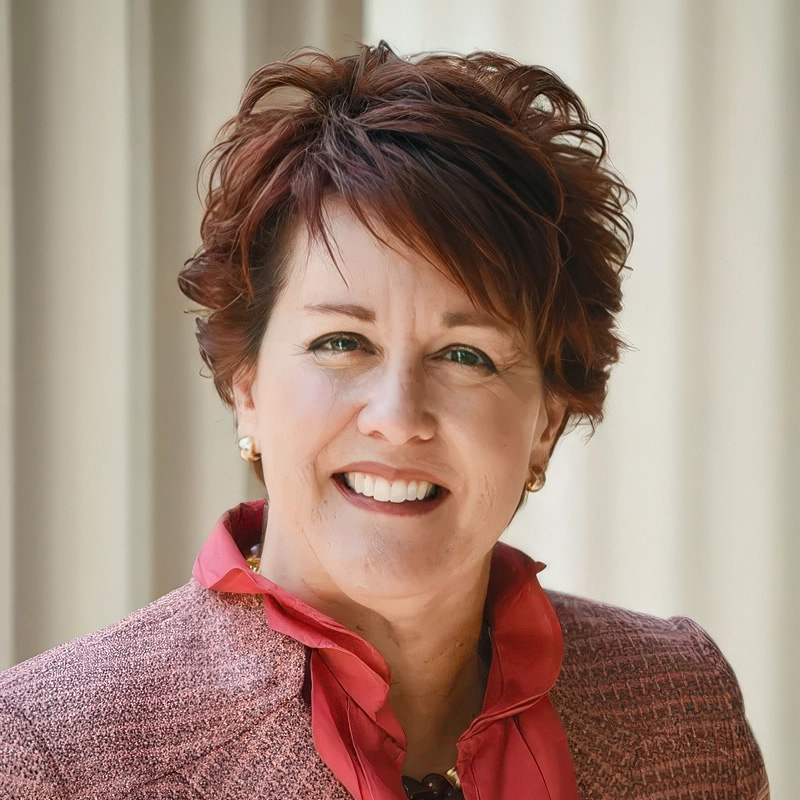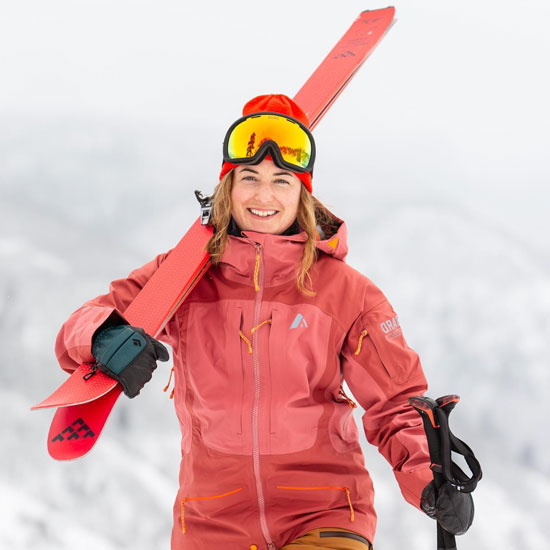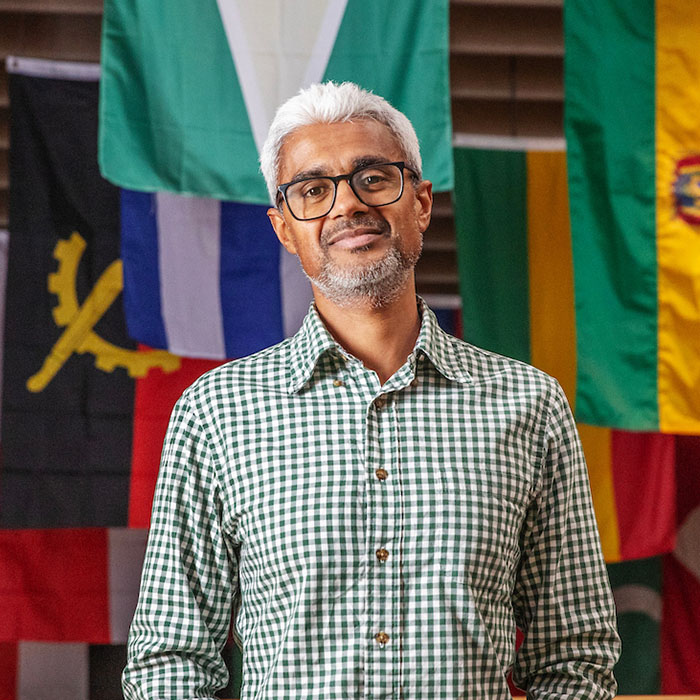Help at the end
Eighty percent of Americans die in hospitals, nursing homes and hospices, and increasing
numbers of them receive bedside care from specially trained volunteers as well as
health professionals. Now a summer fellowship offered jointly by Skidmore and Union
colleges helps qualified students participate in CARE (Community Action, Research
and Education), an eight-week, full-time, structured program of community service
and research that builds the emotional, intellectual, and hands-on skills to support
people while they die.
CARE provides a stipend, enabling students to focus their summer energies on the program
without juggling competing coursework or employment. The program was conceived by
Union College's director of health professions, Carol Weisse, and was further developed
by Skidmore social-work professor and associate dean of the faculty Crystal Moore.
Both have deep experience and dedication to end-of-life care, and both are so moved
by students' experiences that they oversee CARE as volunteers.
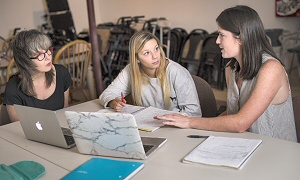
Prof. Crystal Moore reviews paperwork with Union College students Kristen St. Andrews and Sydney Keane, at the Mary's Haven home for the dying. (Photo by Erin Covey)
Students can join CARE through the New York Six consortium, which includes Skidmore,
Union and four other upstate colleges. In readings, journaling and meetings with professors
and care-givers, the CARE syllabus addresses topics such as loss and grief, dignity
at the end of life, the challenges and burdens of caregivers and working in an interdisciplinary
team, but the centerpiece of the program is hands-on service. Students placed in end-of-life
agencies take on the role of a surrogate family member, providing care from feeding
and toileting to bathing and dressing. Sometimes they hold the hand of a person as
he or she dies, or they talk with grieving family members.
"I'm a keen believer in caregiving and aiding others, and this provides a chance for
me to develop characteristics such as attentiveness and patience," says Skidmore's
Jason Bourdier '18, who is majoring in health and exercise sciences. "I want to be
a positive figure or presence in the life of the residents, as well as learn valuable
lessons."
One lesson that impressed him: "It is very difficult to accept the loss of strength
that comes with illness and old age, especially in the presence of family and friends.
People don't like that they are no longer capable of performing simple daily tasks.
One resident was distraught when I brought her juice in a 'sippy cup' because she
had trouble lifting a glass without spilling."
Weisse says, "Students' narratives about personal transformation are eye-opening,"
but valuable research is also conducted and shared. In one instance, Skidmore students
were approached by a family member who saw food left over and said, "You're not feeding
my mother." This prompted two nutrition majors to study eating at the end of life,
including issues related to pain and appetite. As a result of their research, residents
and families received helpful information, and a pamphlet was created for future use.
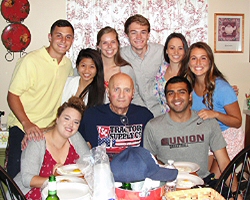
A care-home resident throws a party for program
fellows on their last day.
"CARE is academic and applied, but also spiritual," says Weisse. "Students meet with
each other, with faculty, and with other professionals so they can share and process
what they're learning." Moore has seen "students fall in love with working with patients
at the end of life" and hopes they see the field as a fulfilling career option. "We
get students interested in social welfare, nursing, psychology ... and they become
passionate and motivated. It's not about medical issues, but about being present in
the face of suffering and about compassion, problem-solving and ethics. Also, students
learn how to normalize the experience of dying." She says, "It takes courage and steadfast
presence, but it's a great service."
Catherine Adams, a physician on the palliative care team at Albany's St. Peter's Hospital,
had "a wonderful experience meeting with the students." Palliative care is a new,
team-based specialty providing "an extra layer of support to patients and families
dealing with a serious illness such as cancer, dementia or heart failure. "Because
it's so new, it's important to educate future health care professionals about palliative
care and hospice services." She reports that when CARE students asked how she copes
with end-of-life care every day, she told them, "It's because I accept that even if
we cannot cure, there are many things we can do to relieve suffering. CARE students
learn firsthand the importance of listening to the patient's fears and being present
for the family."
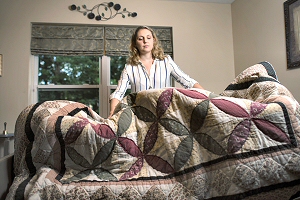
Elisa Smith '18 makes a bed at the Joan Nicole Prince Home.
(Photo by Erin Covey)
Elisa Smith '18, studying social work and French, recently lost a friend to suicide
and has a grandparent with dementia. She reflects, "Death is the ultimate unknown,
so we are fascinated; however, we are simultaneously terrified of the physical and
emotional pain it may bring. This summer program has been life-affirming and inspired
me to want to care for people. I think I have touched residents in ways that heightened
their ability to see beauty even while they are dying." In holding the hand of sleeping
patient, she says she tried "to transfer my care through human touch and make him
feel respected and valued." When an artist with brain cancer sketched her, "it felt
special to contribute to his creativity and to empower his well-being and sense of
dignity." Such moments have taught her "to value human touch and to remain in tune
with all the senses."
Exercise science major and biology minor Astrid Rodriguez '18 intends to become a
nurse practitioner and has volunteered at hospitals. As a CARE fellow last summer,
she learned that "death is not a subject that people should steer away from ... everybody
has to face it."
Union College biology major Matt Liquori says his understandings have grown more from
"the emotional and social interactions I've witnessed than from the actual medical
care I've seen delivered." In one "gut-wrenching" interaction, a resident was hallucinating
and combative, and his wife was very upset until Liquori intervened and calmed her
down, with the incident ending in a hug. Liquori says, "This really highlighted the
emotional challenges families face coping with an impending loss." —Helen Edelman '74
